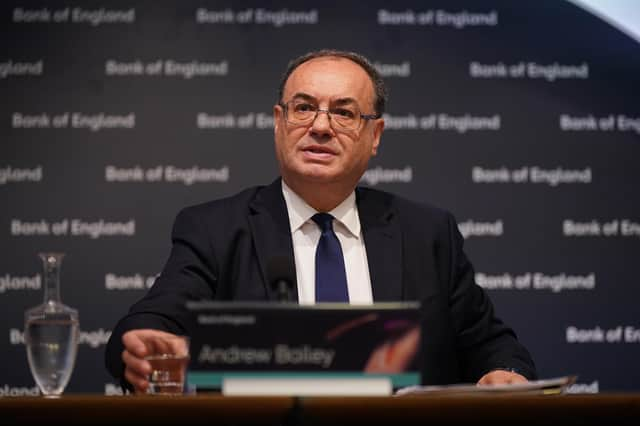Bank of England will 'stay the course' to get inflation back on target


Speaking during a Treasury Committee hearing, Bank of England bosses said it was ‘plausible’ inflation could reach 20 or 22 percent - as forecast by Goldman Sachs, but that this was heavily dependent on wholesale gas prices, given how large a proportion of UK incoming is set to be spent on energy.
When asked whether he felt helpless about the inflation situation, Mr Bailey said: “We can’t control what Vladimir Putin does. Let’s be blunt about it. What we can and must and will control is bringing inflation back to target. There is no question about that. We will do that. We will stay the course to do that.”
Advertisement
Hide AdAdvertisement
Hide AdThe Bank of England’s Huw Pill was asked whether he thought it was realistic inflation could ‘rip up’ to 20 or 22 per cent.
He said: “I think it’s plausible. Given the magnitude of changes in wholesale prices we’ve seen, that feeding through into utility prices can lead to these kind of effects.
"In other words, it’s an illustration of the uncertainties that are created around any forecast for inflation by its dependence at present on very volatile developments in wholesale energy prices.”
Asked whether he could rule out inflation going well above the current official forecast, he said: “I think it depends on wholesale gas prices, and what happens to the machinery by which those prices are translated into retail prices.
Advertisement
Hide AdAdvertisement
Hide Ad"I don’t need to tell people around this table that is something that’s up for consideration in the political sphere, and we will have to be reflective of that.”
Gareth Davies, Conservative MP for Grantham and Stamford asked the Governor whether he thought the European gas market was “out of control”
Mr Bailey said: “Of course it’s being affected by a huge shock, which is the behaviour of Russia, we can’t get away from that.
“The market is under stress, because if you’ve got a major supplier effectively cutting the supply off it is unsurprising it is under a lot of stress.”
Advertisement
Hide AdAdvertisement
Hide AdMr Pill added: “We should be cautious about saying if we do fall into a recession – and that is what we forecast in our August report, and it’s certainly possible before the end of this year – I think it’s important to emphasise, that’s a consequence of the impact of higher energy prices on the real incomes of UK residents.
"We are a net importer of energy. What we are buying from the rest of the world has gone up in price very significantly relatively to what we’re selling. That has an impact on our purchasing power and ultimately on our demands and activity.
“So I think we need to be cautious about saying monetary policy is causing the recession.”
During the committee hearing, Labour MP Rushanara Ali questioned whether Government stimulus - in the shape of help for energy bills and tax cuts - could add to inflation. Mr Bailey said: “It’s important to reiterate that monetary policy is operated independently by the Bank of England and fiscal policy is operated independently by the Government.”
He agreed that the two were not isolated, and said: “We obviously take into account fiscal policy as it is set out by the Government, and whatever is announced this week we will do just that.”
Comment Guidelines
National World encourages reader discussion on our stories. User feedback, insights and back-and-forth exchanges add a rich layer of context to reporting. Please review our Community Guidelines before commenting.